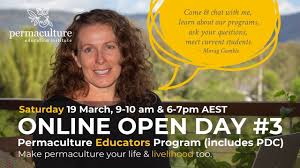Exploring the Benefits of Permaculture Programs
Permaculture programs offer a unique approach to sustainable living and land management, focusing on principles that promote harmony with nature while meeting human needs. These programs encompass a wide range of activities, from designing regenerative landscapes to fostering community resilience and promoting ecological stewardship.
One key benefit of permaculture programs is their emphasis on creating self-sustaining systems that mimic natural ecosystems. By integrating diverse plant species, animals, and structures in a thoughtful and intentional way, permaculturists can create productive and resilient landscapes that require minimal inputs of water, energy, and resources.
Permaculture programs also play a crucial role in promoting food security and local food production. By designing edible landscapes, implementing agroforestry systems, and practicing organic gardening techniques, participants in these programs can learn how to grow their own food in a sustainable and regenerative manner.
Furthermore, permaculture programs provide valuable opportunities for education and skill-building. Participants can learn about topics such as soil health, water conservation, biodiversity conservation, renewable energy systems, and more. By gaining hands-on experience in implementing permaculture principles, individuals can develop the knowledge and skills needed to create positive change in their own lives and communities.
In addition to environmental benefits, permaculture programs also contribute to social cohesion and community building. By bringing people together around a shared interest in sustainability and resilience, these programs foster connections between individuals who are passionate about creating a more sustainable future for all.
In conclusion, permaculture programs offer a holistic approach to sustainable living that addresses environmental, social, and economic challenges. By participating in these programs, individuals can gain the knowledge, skills, and inspiration needed to create thriving ecosystems, resilient communities, and a more harmonious relationship with the natural world.
Exploring Permaculture Education: Degrees, Studies, Learning Paths, and the Value of Design Certificates
- Is there a degree in permaculture?
- What is the study of permaculture?
- How do I learn permaculture?
- Is a permaculture design certificate worth it?
Is there a degree in permaculture?
While there is no formal degree specifically in permaculture, many educational institutions offer courses, certifications, and programs in permaculture design and principles. These programs range from short workshops and online courses to more comprehensive permaculture design certification courses that provide in-depth training on sustainable land management, regenerative agriculture, and ecological design. While a degree in permaculture itself may not exist, individuals interested in pursuing a career or furthering their knowledge in this field can explore these various educational opportunities to gain expertise and practical skills in permaculture practices.
What is the study of permaculture?
The study of permaculture revolves around the principles and practices of designing sustainable and regenerative systems that harmonize with nature. Permaculture integrates concepts from ecology, agriculture, architecture, and social sciences to create resilient ecosystems that provide for human needs while enhancing biodiversity and ecosystem health. By studying permaculture, individuals learn how to mimic natural patterns and processes in their designs, promote resource efficiency, and foster community resilience. Ultimately, the study of permaculture empowers individuals to become stewards of the land, creating thriving landscapes that benefit both people and the planet.
How do I learn permaculture?
Learning permaculture is an exciting journey that offers a wealth of opportunities for personal growth and environmental stewardship. To embark on your permaculture learning experience, you can explore a variety of options, including workshops, courses, online resources, and hands-on projects. Many permaculture programs offer certification courses that cover the fundamental principles and practices of permaculture design, providing you with a solid foundation to start implementing sustainable solutions in your own life and community. By engaging with experienced permaculturists, attending events, and immersing yourself in practical applications of permaculture principles, you can deepen your understanding and develop the skills needed to create regenerative landscapes and lifestyles. Remember, learning permaculture is a lifelong journey of discovery and connection with nature – so dive in with curiosity and enthusiasm!
Is a permaculture design certificate worth it?
When considering whether a permaculture design certificate is worth it, it’s important to recognize the value it can bring to both personal growth and sustainable living practices. A permaculture design certificate not only provides a comprehensive understanding of permaculture principles and techniques but also empowers individuals to make informed decisions about land management, food production, and community resilience. By investing in a permaculture design certificate, individuals gain practical skills, networking opportunities, and a deeper connection to nature that can positively impact their lives and the environment. Ultimately, the knowledge and perspectives gained through a permaculture design certificate can be invaluable in creating a more sustainable future for oneself and the planet.

